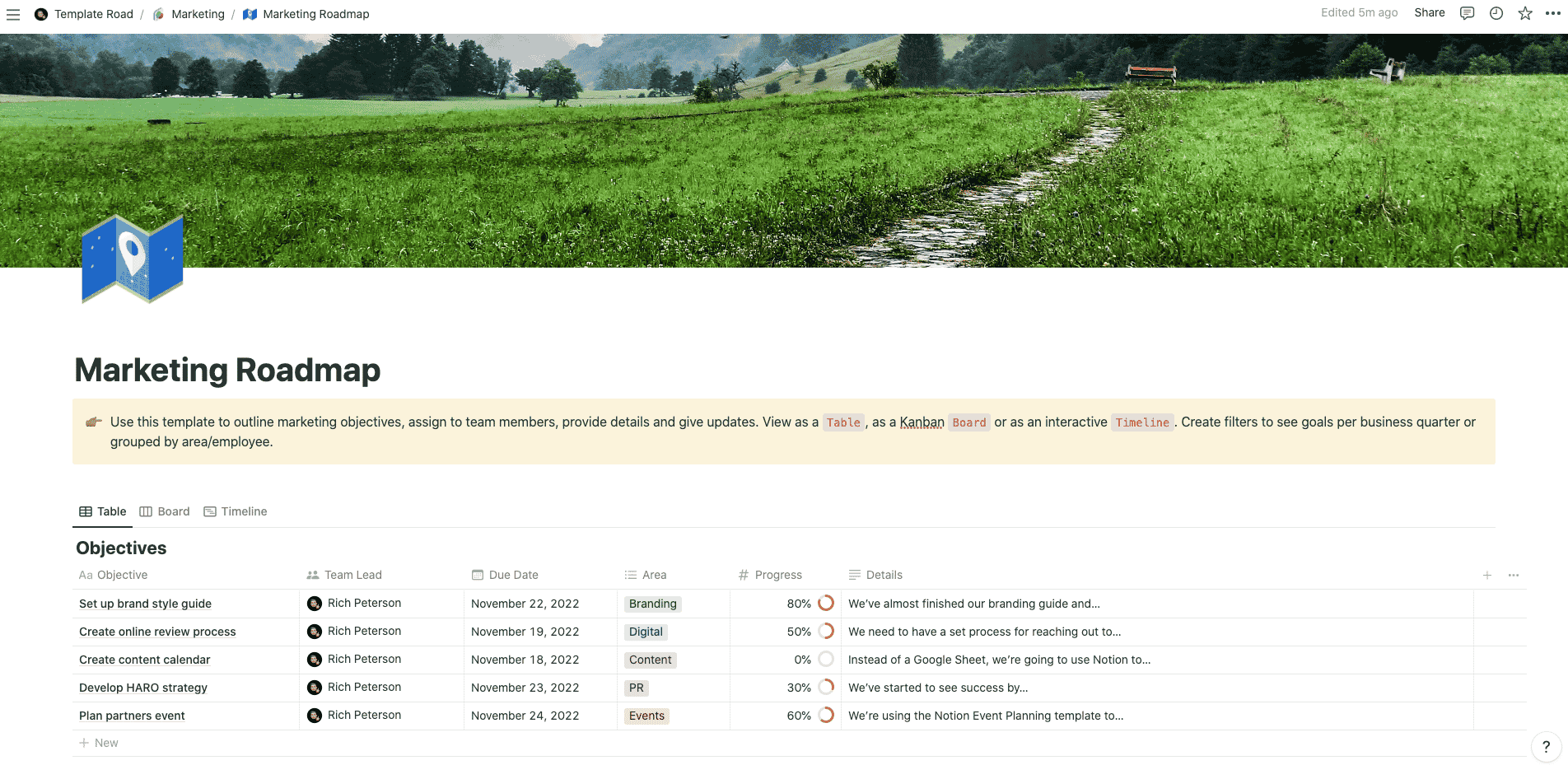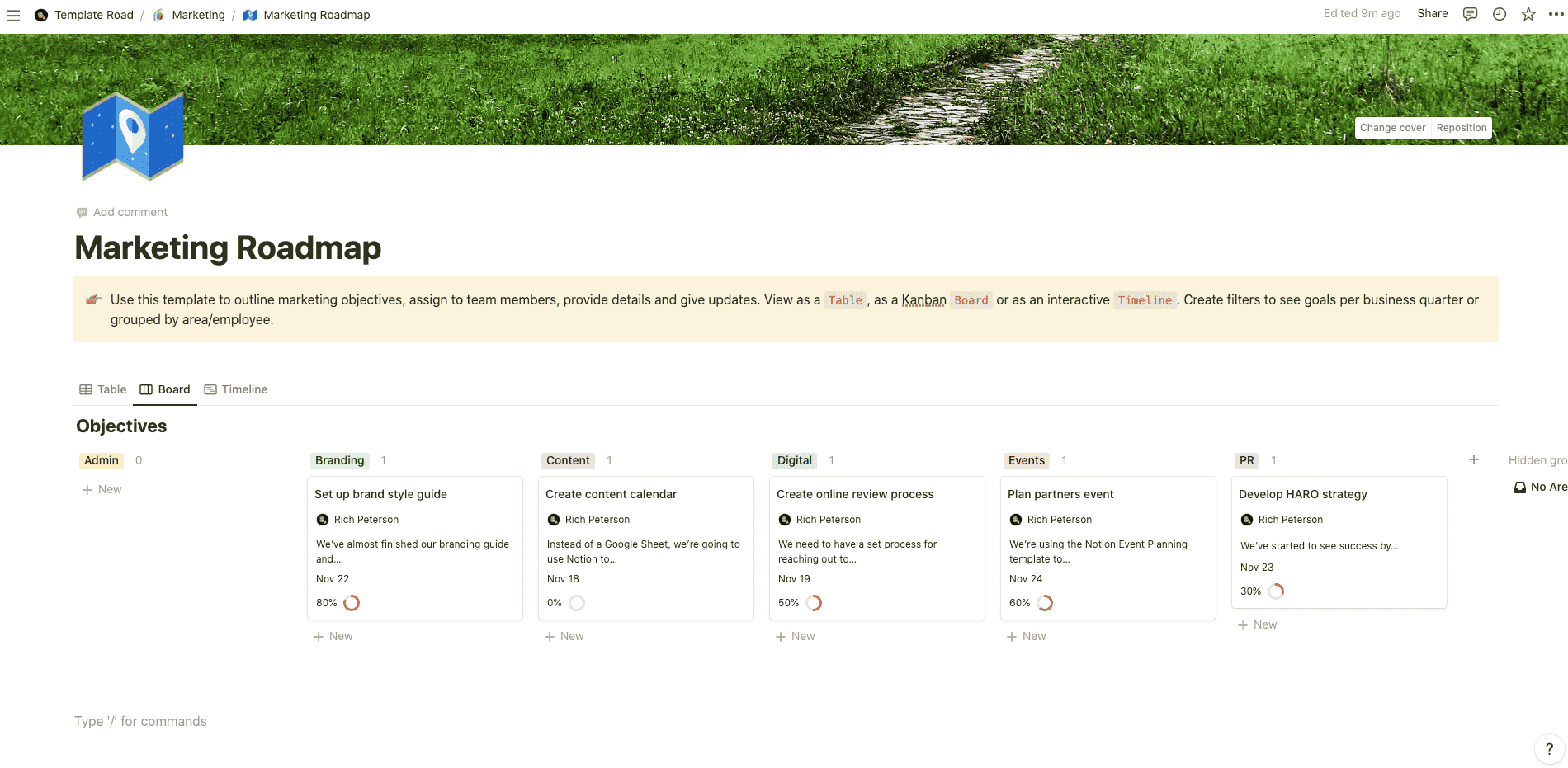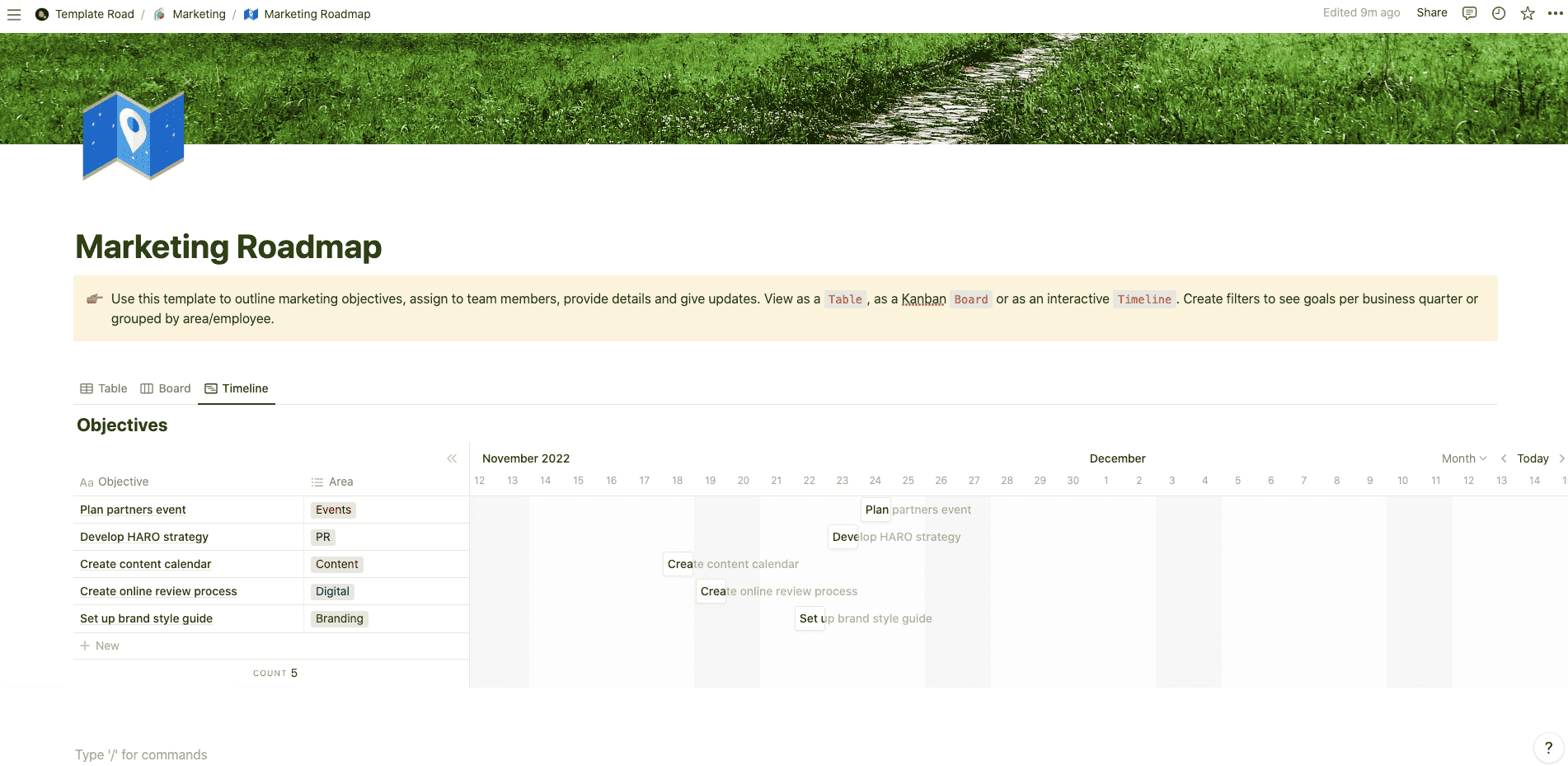Use this template to create a roadmap for your marketing planning.
Buy on
Contents
Notion – Marketing Roadmap Template
Use this template to create a roadmap for your marketing planning. A marketing roadmap outlines the key projects and priorities of a marketing team. Marketing strategies often chart priorities across different media, including content, social, email, mobile, display and paid. Marketing teams are typically task-oriented, with many activities underway at any given time. Roadmaps help clarify goals and keep everyone on track. They can also serve as an important communication tool for marketing teams sharing their plans throughout the company.
——————————————
What you need before purchase
- Basic knowledge of how to use Notion
- Paid Notion account if you’re looking to add lots of content to your template / Notion account (sign up here). Not much content? You’re able to use their free account.
After purchase, you’ll be able to view the template immediately. The template can be added to your Notion account by:
- Click on the template download link in Gumroad
- When viewing the Notion template, click on the “Duplicate” link in the top-right of your screen
- The template will now be available in your own Notion account
What is a Marketing Roadmap Template?
A Marketing Roadmap Template is a visual representation or plan that outlines the strategic initiatives, goals, and timelines for marketing activities within an organization. It provides a structured overview of marketing campaigns, projects, and key milestones, helping marketing teams coordinate and communicate their strategies effectively.
The Marketing Roadmap Template typically includes the following components:
- Timeline: A timeline serves as the backbone of the roadmap, indicating the duration of marketing activities. It can be displayed in months, quarters, or any other relevant timeframes. The timeline provides a visual representation of when each initiative or campaign will take place.
- Marketing Goals: This section outlines the high-level marketing goals or objectives the team aims to achieve within the designated timeframe. These goals should be specific, measurable, attainable, relevant, and time-bound (SMART).
- Initiatives or Campaigns: The marketing initiatives or campaigns are the specific projects or activities planned to achieve the marketing goals. Each initiative should be described concisely, including its purpose, target audience, key messages, and desired outcomes.
- Key Milestones: Key milestones are significant events or checkpoints within the marketing roadmap that help track progress and ensure timely execution. Milestones can include the launch of a campaign, the completion of a project phase, or important marketing events or promotions.
- Responsible Parties: Assigning responsibilities to team members or departments ensures clear ownership of each initiative or campaign. Indicate the individuals or teams responsible for executing and managing the activities to foster accountability and coordination.
- Resources and Budget: This section highlights the resources required to execute the marketing initiatives successfully. It includes elements such as budget allocations, personnel, technology, or external services needed to support the marketing roadmap’s implementation.
- Dependencies: Dependencies identify the interconnections between different marketing initiatives or campaigns. These dependencies help teams understand the order of activities and potential bottlenecks or constraints that might impact the overall timeline.
- Progress Tracking: A progress tracking mechanism, such as milestones, progress bars, or status indicators, can be incorporated into the template. This feature provides a visual representation of how each initiative or campaign is progressing toward completion.
The Marketing Roadmap Template allows marketing teams to plan, visualize, and communicate their strategies effectively. It helps align marketing activities with business goals, facilitates collaboration and coordination, and provides a comprehensive view of the marketing landscape over a specific timeframe. The template can be shared with stakeholders, team members, or executives to gain buy-in and provide transparency regarding the marketing initiatives.
How do I create a Marketing Roadmap Template in Notion?
To create a Marketing Roadmap Template in Notion, you can follow these steps:
- Open Notion: Launch the Notion application on your device or access it through your web browser.
- Create a New Page: Click on the “+” button or select “New Page” to create a new page for your Marketing Roadmap Template.
- Choose a Template: Template Road offers several template options. You can either start with a blank page or use a pre-designed template that suits your needs. To find a suitable template, you can search for keywords like “marketing roadmap,” “marketing plan,” or “roadmap template” in the Template Road Notion template gallery.
- Customize the Template: Once you’ve selected a template or started with a blank page, you can customize it to create your Marketing Roadmap Template. Modify the headings, sections, and subheadings to match the components mentioned earlier, such as Timeline, Marketing Goals, Initiatives or Campaigns, Key Milestones, Responsible Parties, Resources and Budget, Dependencies, and Progress Tracking.
- Timeline: Add a timeline to visually represent the duration of marketing activities. You can use tables, calendars, or other visual elements available in Notion to create a timeline that fits your needs.
- Marketing Goals: Create a section to outline the marketing goals or objectives you want to achieve within the designated timeframe. Clearly state the goals and make them specific, measurable, attainable, relevant, and time-bound (SMART).
- Initiatives or Campaigns: Create subsections or bullet points to list the specific marketing initiatives or campaigns planned. Describe each initiative or campaign concisely, including its purpose, target audience, key messages, and desired outcomes.
- Key Milestones: Add milestones to mark significant events or checkpoints within the marketing roadmap. Use visual elements such as checkboxes, progress bars, or labels to indicate the progress of each milestone.
- Responsible Parties: Create a section or table to assign responsibilities to team members or departments for each marketing initiative or campaign. Clearly indicate the individuals or teams responsible for executing and managing the activities.
- Resources and Budget: Include a section to highlight the resources required for the successful implementation of the marketing roadmap. Specify elements such as budget allocations, personnel, technology, or external services needed to support the marketing initiatives.
- Dependencies: If there are dependencies between different marketing initiatives or campaigns, include a section to outline these connections. This helps teams understand the order of activities and potential bottlenecks or constraints that might impact the overall timeline.
- Progress Tracking: Use visual elements such as progress bars, status indicators, or colour-coded labels to track the progress of each marketing initiative or campaign. This provides a visual representation of how activities are progressing toward completion.
- Save as a Template: After customizing your Marketing Roadmap Template, save it as a template in Notion. This allows you to reuse it for future projects by duplicating the template for each roadmap.
By following these steps, you can create a Marketing Roadmap Template in Notion that suits your marketing planning and visualization needs. Notion provides flexibility and customization options, allowing you to tailor the template to your specific marketing projects and goals.
















